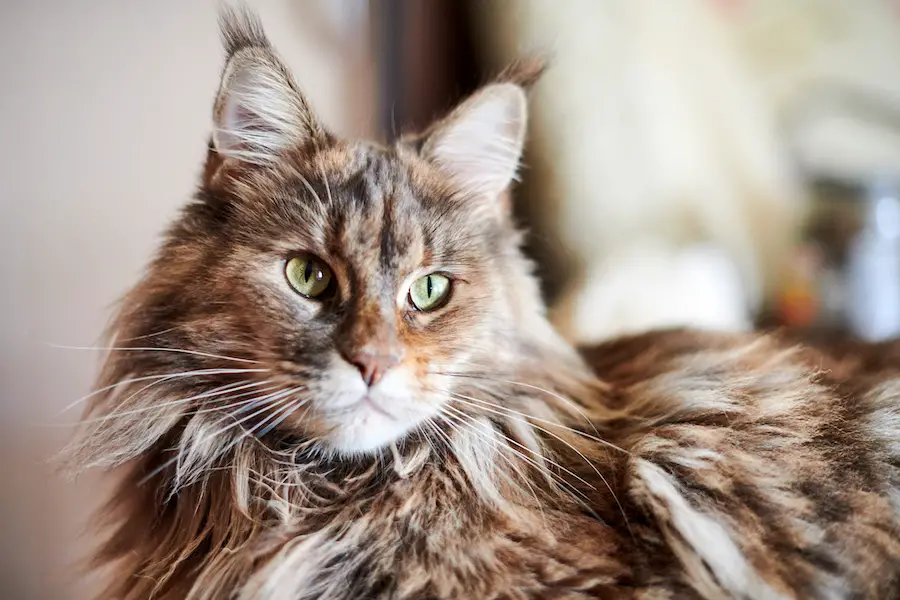Maine Coon Cat Facts
Introduction
The Maine coon cat is one of the oldest natural breeds in North America. According to an ornithologist from Wisconsin, the ancestors of these cats can be traced back to their native home in New England where they were prized by sailors for their intelligence, sociability with other animals, and their ability to hunt.
Maine Coons are known for being intelligent, curious, and easy to train cats who typically have a gentle disposition. They are the largest breed of domestic cat. They’re valued by owners for their intelligence, playfulness, and sociability with other pets and children, and, because they are quiet cats who seldom annoy or show aggression toward other pets. They are good hunters, a trait they retained from their wild ancestors.
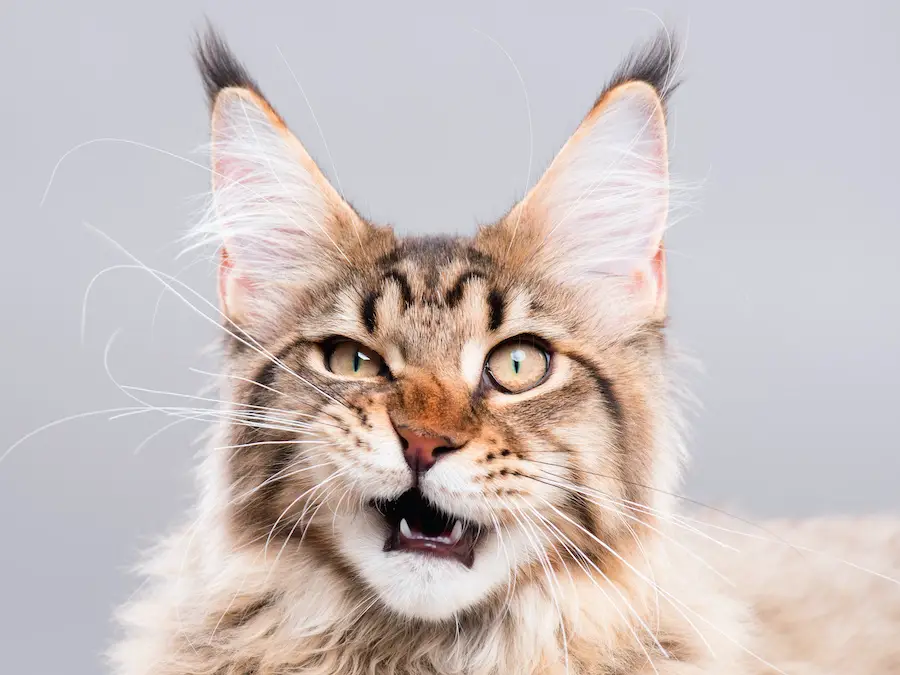
Breed Quick Facts
Lifespan
14 Years
Size
13-18 lbs
Origin
Maine, United States
History of Maine Coon Cats
Maine Coons have been spotted in paintings from the 1800s that depict people from seaport towns in New England. In Maine, tradition holds that the sailors who brought them to portholes told locals that they had “acquired” these animals during trips overseas.
Maine Coons are one of America’s oldest natural breeds and were known as early as the 1860s. These cats have long been popular for their capability to hunt vermin in barns and mills, but they were not recognized as a unique breed until the late 19th century. The breed has since become popular throughout the United States, Europe, and Asia. There are several theories about the origin of the Maine Coon Cat, but its history is probably similar to that of other long-haired breeds originating in northeastern America during the 19th century.
The most common and probably the most accurate theory is that they are descended from cats belonging to Marie Antoinette during her exile in France. According to this theory, these cats were brought back to the New World by French Canadian seafarers, but there is no historical evidence for this story. Another story tells of a ship carrying felines sinking off the coast of Maine during the late 18th century. It is possible, however unlikely, that some of these cats could have made their way to shore. The first documented ancestors were a pair of cats owned by Rita Pinette in Wiscasset, Maine.
The breed was developed beginning in 1895 when a female named “Maine Crusader” was mated to a tomcat named “Parti colored Preacher”, and a male that likely belonged to a feral colony in Maine’s Victoria Beach. These cats were listed in the studbook from 1895 until all offspring were sold in 1904.
In the early days of the breed, outcrosses were common due to a small gene pool. These out-crosses included domestic cats, American Shorthairs, and Russian Blues. B.O. Smith, who bred Maine Coons with several Maine Coon breeders in the early 20th century, is credited with popularizing the breed in cat shows beginning in 1906 after the Maine State agricultural fair, where he won blue ribbons.
The breed was declared the official state cat of Maine in 1985.
Maine Coons are large upright cats with long silky fur featuring brown tabby, silver tabby, and gray shaded patterns. The ‘classic’ tri-color is not seen in many purebred cats these days due to wide.
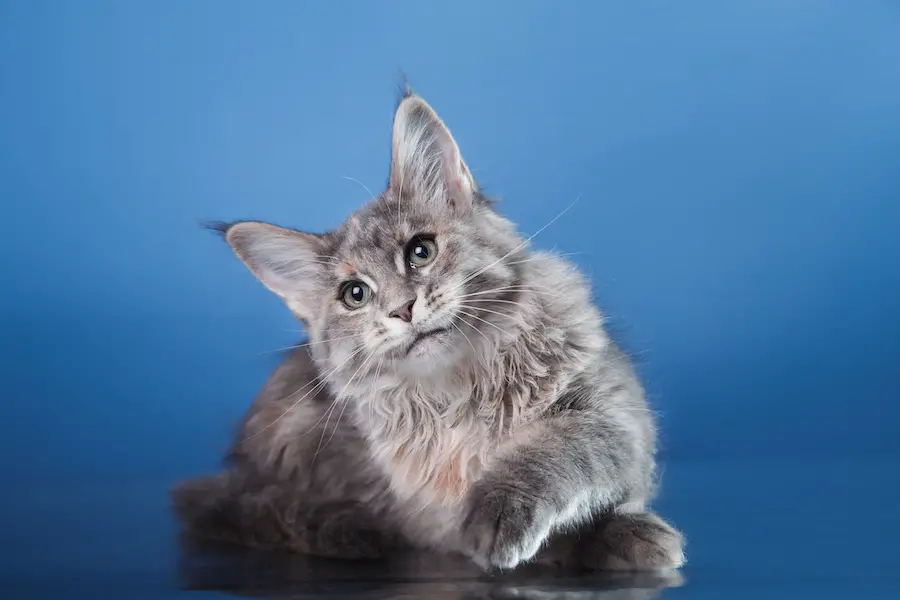
Physical Appearance of the Maine Coon Cat
Their fur is long and shaggy, with a thick undercoat. It can be any color, but dark brown or black with white markings are preferred by breeders. Because of the size of this breed, it should come as no surprise that they can weigh up to thirty pounds, and grow as tall as three feet. In fact, the Maine Coon cat is the tallest breed of domesticated cats.
Maine Coons are often called cats with “Gentle Giants” or “Giant Persians” due to their large size and sturdy bone structure. They have very long, fluffy tails which are almost as long as the rest of their bodies.
Maine Coons are very intelligent, active, and loyal cats who will keep their owners. A distinctive feature that Maine Coons have is their square-shaped faces with relatively short noses. Their big round eyes are a striking blue color. They also come in different colors and coat patterns such as:
— solid (all one color, including white)
— tabby (striped or “marbled”)
— tortoiseshell
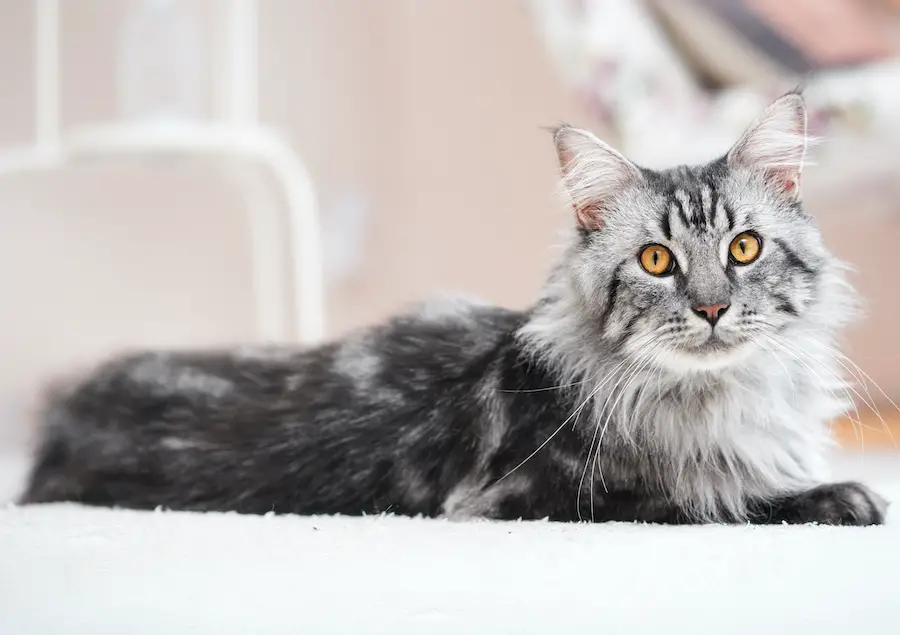
The Personality of Maine Coon Cats
Maine Coons are known to be very dignified and aloof. They appear rather large and lumbering — which is exactly what they’re not! Maine Coons can be incredibly agile and acrobatic, and an excellent mouser. They like to play games like fetch and will bring back the toy to you, so if you have a busy schedule, it would be wise not to leave your Maine Coon unattended with any open strings or loops, as this is an invitation for them to play.
In addition, they are known to be “talkers,” and most will eventually learn how to meow in a manner that seems almost indistinguishable from a human talking.
Maine Coons are typically very gentle cats, and they enjoy spending time with their humans. They tend to be loyal companions who like to follow you around the house. If you like to read in bed at night, your cat will probably want to curl up next to you; if you work on the computer, expect your cat to sit on the desk and help out with whatever task you’re doing.
Maine Coons are not excessively demanding cats when it comes to playtime, food, or attention. They seem perfectly happy to entertain themselves for long periods and will often spend their days sleeping in a sunny spot and watching the household activity from a safe distance.
Grooming Maine Coon Cats
Maine Coons tend to shed their undercoats once a year which you can help your cat by brushing them regularly if they have long hair. If your cat is a short-hair, you still want to brush them regularly to prevent their fur from matting.
Maine Coons, unlike other breeds, are not known to be hypoallergenic. If you have an allergy but want a Maine Coon cat, there are certain breeds of cat that produce fewer allergens which may work better for you.
Caring For Your Maine Coon Cat
Your Maine Coon feline prefers living in a house with a fenced-in yard where they can explore and play safely outside. They are very curious animals by nature and enjoy getting into all kinds of adventures. Indoors, you may find them climbing on furniture and cupboards, playing with house plants, and exploring their surroundings.
Maine Coons make very good family pets because they are affectionate and great with children. They also get along well with other cats, dogs, and even pet birds.
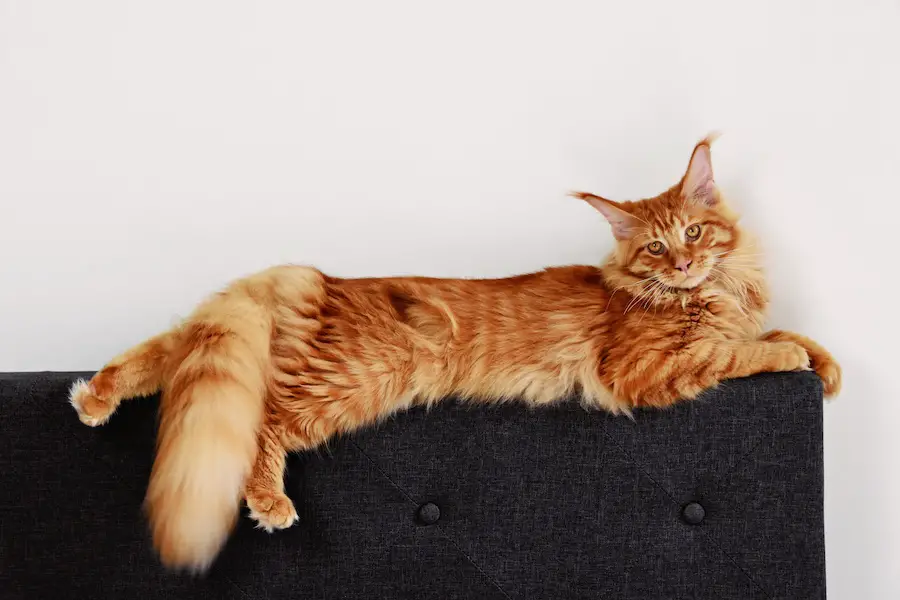
What Do Maine Coon Cats Eat?
The Maine Coon is an average energy breed of cat. A usual diet consists of dry food, wet food, or a combination of both depending on the owner’s preference.
Fresh water should be available at all times for the cat to drink when needed. Canned food usually has more moisture than dry kibble which can help keep your pet hydrated throughout the day.
Health Problems That Affect Maine Coon Cats
Maine Coon cats are generally healthy, but like all purebreds, they’re prone to certain health conditions. Here are some disorders that can affect Maine Coon cats:
- Polycystic kidney disease (PKD) is a genetic kidney disorder that affects many purebred cats, including Maine Coons. It is the most common feline renal disorder and can result in kidney failure if not treated.
- Hypertrophic cardiomyopathy (HCM) is the most common heart disease in cats and can be found in Maine Coons.
- Congenital hypothyroidism, which affects many purebreds (and mixed-breeds too), tends to show up in Maine Coon kittens between 4 and 8 weeks of age. It’s readily treatable with hormone supplementation.
- Feline hyperesthesia syndrome (FHS) is a disorder of the nervous system that can result in self-destructive behavior, including self-mutilation and inappropriate aggression. It’s also known as “twitchiness” or “scratchy cat syndrome.” Although it occurs most often in purebreds, it’s not specific to any one breed.
Conclusion
Maine Coon cats make good pets, somewhat comparable to dogs because they are intelligent and have skills that go beyond just being a companion animal. They can even be trained to help people with disabilities or keep watch for intruders. Their close bond with their human family members means that they are very affectionate and this helps them become part of a multi-species household with ease. Their peaceful nature also makes them good pets for households where children are present. They will even happily share their home with other cats or dogs as long as they have been introduced to them when they are very young, ideally when they’re still a kitten. Maine Coon cats need a good deal of human contact to stay healthy and happy. Without it, they will become stressed.
